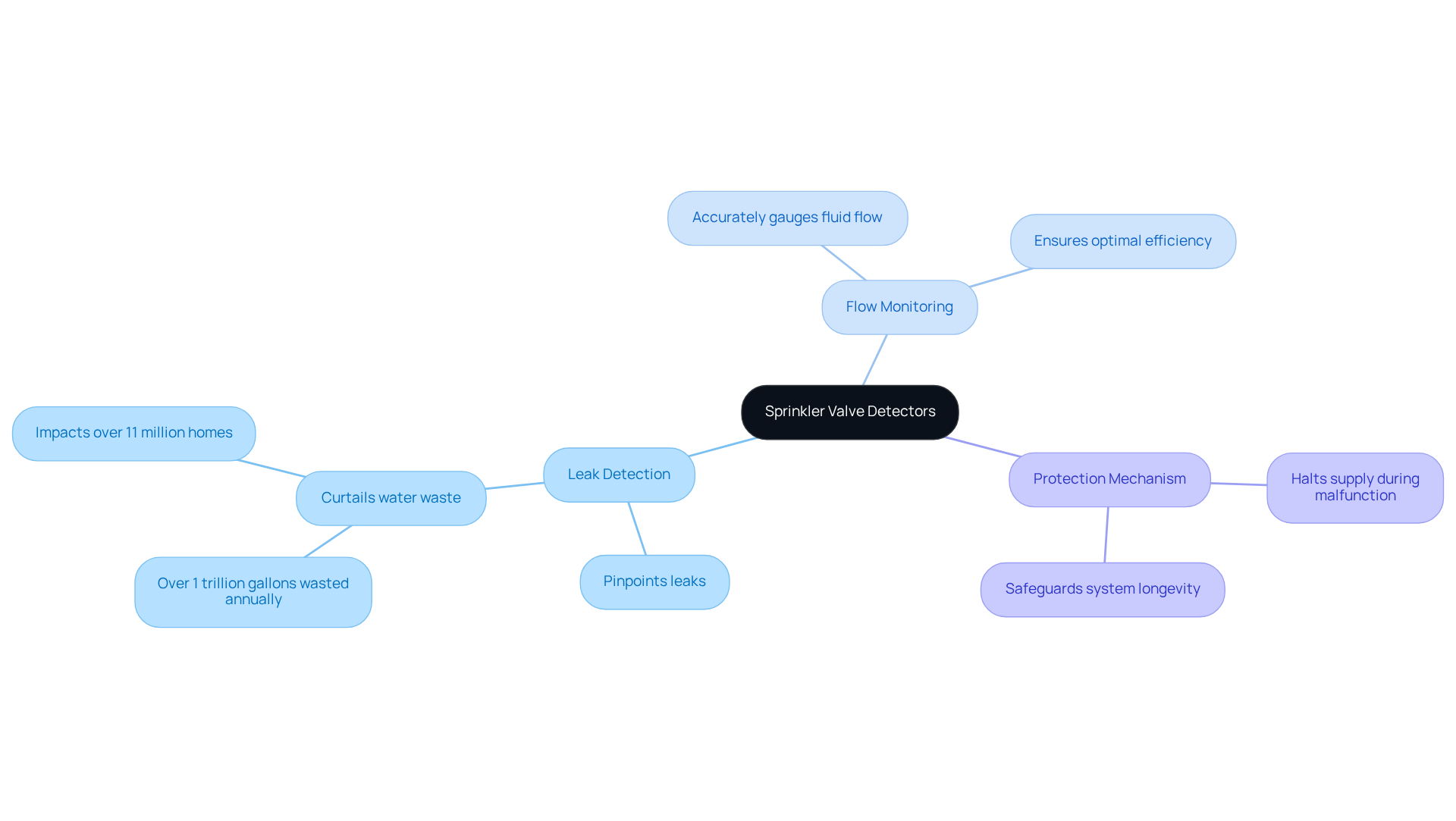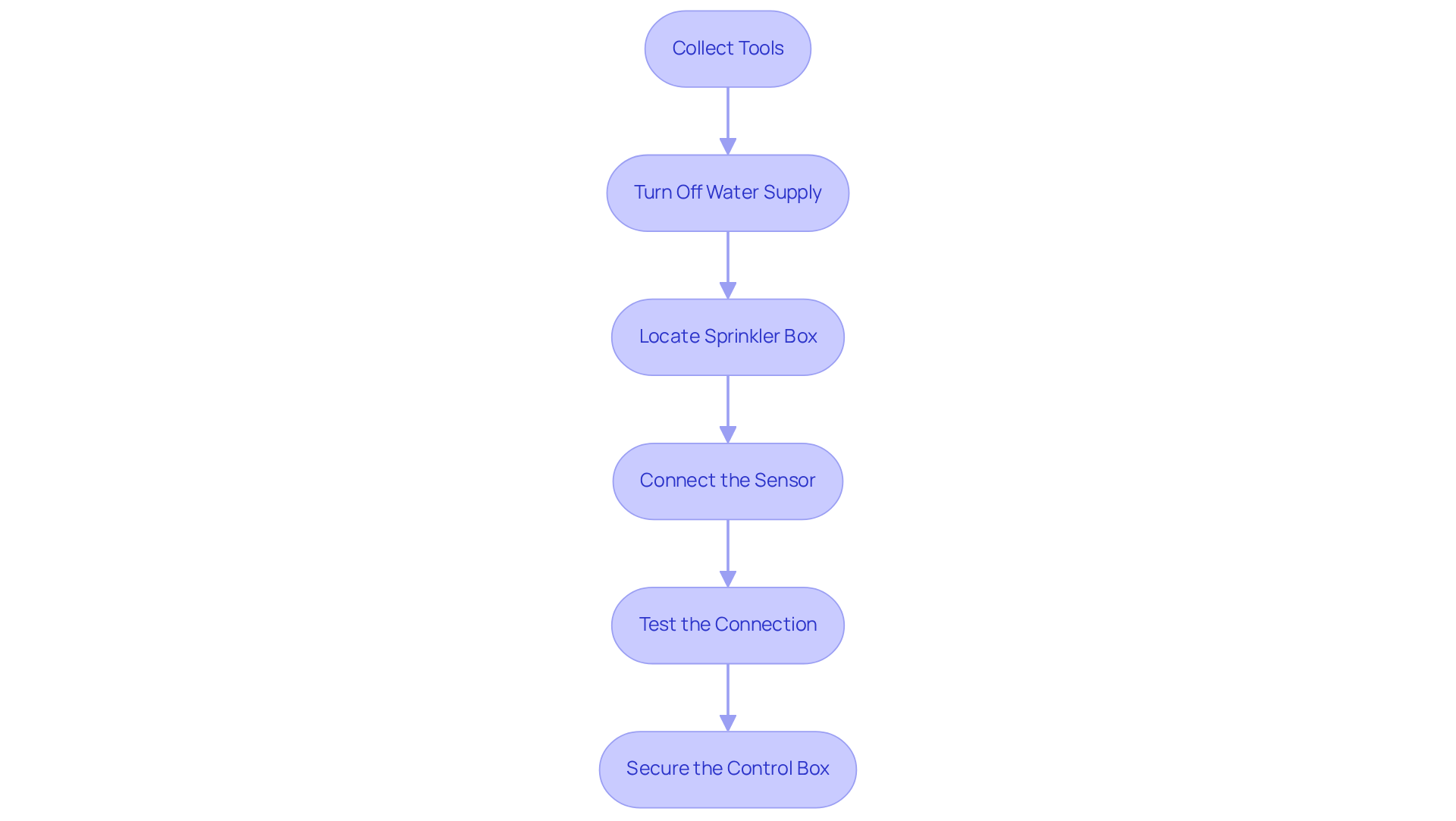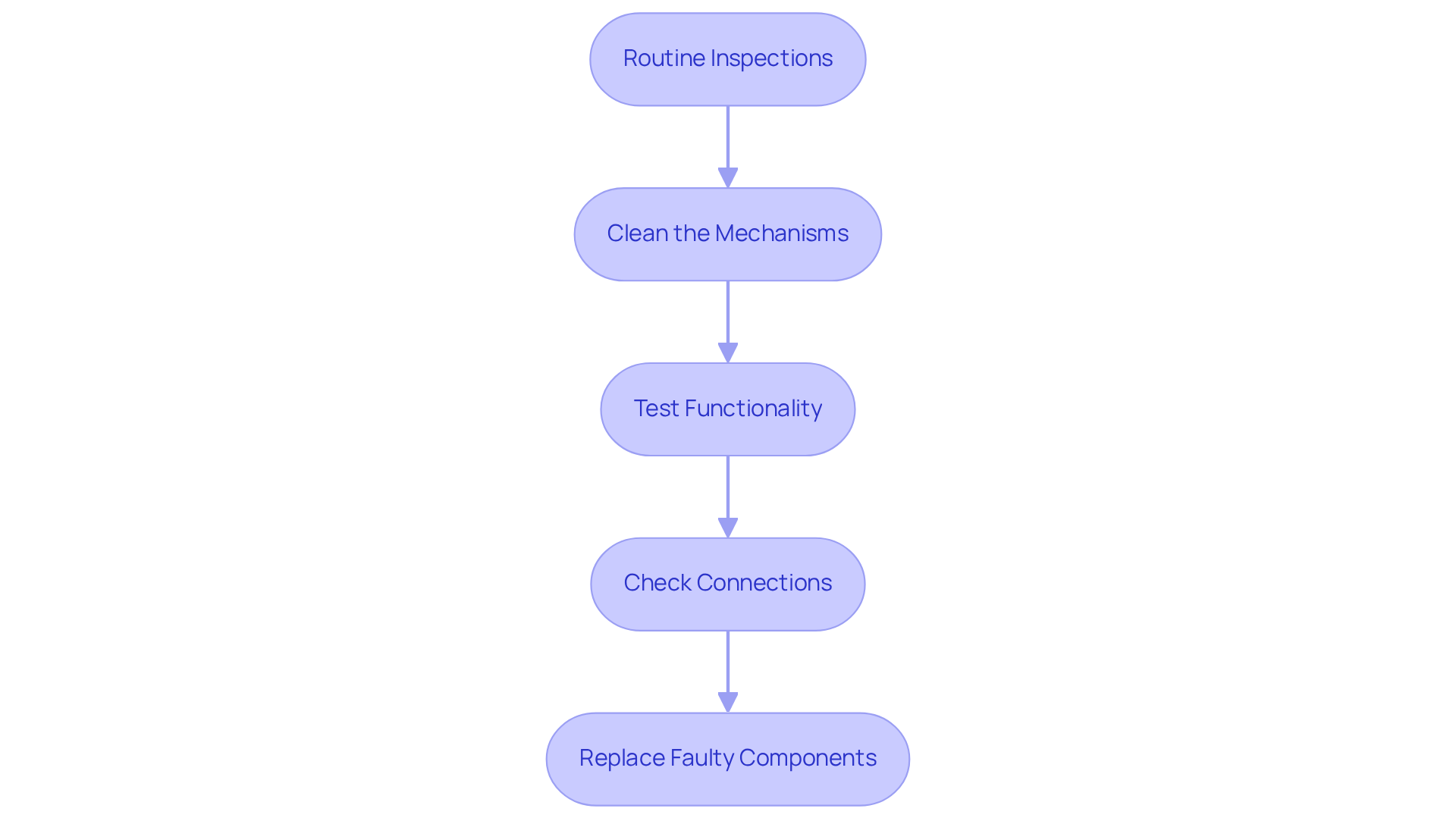Overview
The article highlights the critical role of sprinkler valve detectors in the installation and maintenance of irrigation systems, emphasizing their function in monitoring flow and preventing water waste. It outlines the installation process, necessary tools, and routine maintenance practices, showcasing how these detectors significantly enhance system efficiency while protecting against leaks and malfunctions. Furthermore, by implementing these detectors, users can ensure optimal water usage and safeguard their investments in irrigation technology.
Key Highlights:
- Sprinkler valve detectors monitor and regulate irrigation flow, crucial for efficient water usage.
- They detect leaks, preventing significant water waste, which affects millions of homes and leads to over 1 trillion gallons lost annually.
- Flow monitoring ensures the irrigation system operates efficiently, optimising fluid usage and reducing costs.
- In case of malfunctions, these detectors can halt water supply to protect the system from damage.
- Installation requires tools like screwdrivers and wire strippers, and must follow specific steps for connexion and testing.
- Routine inspections, cleaning, and testing are essential for maintaining sprinkler valve detectors and ensuring optimal performance.
- Electrical connexions should be checked for security and corrosion to prevent malfunctions.
- Fire sprinkler systems should be inspected annually by certified experts to comply with safety standards.
Introduction
Sprinkler valve detectors are essential components in modern irrigation systems, serving as the primary line of defense against water waste and inefficiencies. These sensors play a vital role by effectively identifying leaks and monitoring flow, ultimately conserving precious resources and improving the overall performance of irrigation setups.
However, the installation and maintenance of these critical devices can present challenges, even for seasoned professionals. Ensuring these vital components function optimally is key to contributing to sustainable water management.
Explore the Basics of Sprinkler Valve Detectors
Sprinkler control sensors are vital components in contemporary irrigation systems, meticulously engineered to monitor and regulate flow through sprinkler controls. Their primary functions encompass:
- Leak Detection: These detectors are instrumental in pinpointing leaks within the irrigation system, effectively curtailing substantial water waste—an issue impacting over 11 million homes across the nation and contributing to an alarming loss of more than 1 trillion gallons of water each year.
- Flow Monitoring: By accurately gauging fluid flow, the sprinkler valve detector ensures that the irrigation system operates at peak efficiency, optimizing fluid usage and reducing costs.
- Protection Mechanism: In the event of a malfunction, the sprinkler valve detector can autonomously halt the supply, safeguarding the system from potential damage and ensuring the longevity of the irrigation infrastructure.
The integration of a sprinkler valve detector in irrigation systems is increasingly essential, with a notable percentage of installations now utilizing such leak detection technology. Real-world examples illustrate that proactive leak detection not only conserves water but also bolsters the overall efficiency of irrigation practices. Experts in the field emphasize that regular maintenance and the use of technologies like the sprinkler valve detector are crucial for maximizing efficiency and minimizing waste. Grasping these fundamentals is essential for anyone engaged in the installation or upkeep of sprinkler systems, as it directly impacts equipment selection and troubleshooting strategies.

Install Sprinkler Valve Detectors: Step-by-Step Guide
Installing a sprinkler valve detector system requires meticulous attention to detail and the right tools. To ensure a successful installation, follow this comprehensive guide:
- Collect essential tools such as a screwdriver, wire strippers, and the detector itself. For this installation, consider renting a drill and a multimeter from EZ Equipment Rental, which provides a wide range of tools to support your project.
- Turn Off Water Supply: Prioritize safety by shutting off the water supply to prevent accidental flooding during the installation process.
- Locate the Sprinkler Box: Identify the sprinkler control box, typically buried underground. Knowing its location is crucial for efficient installation.
- Connect the Sensor: Adhere to the manufacturer's guidelines to link the sensor to the control mechanism. This typically involves connecting the sprinkler valve detector to the valve's solenoid to ensure a secure connection.
- Test the Connection: After connecting, restore the water supply and check the device. Look for leaks and confirm that the sprinkler valve detector reacts appropriately to changes in flow. As Mike Garcia, a licensed landscape contractor, emphasizes, proper installation is key to ensuring effective functionality.
- Secure the Control Box: Once functionality is verified, secure the control box back in place, ensuring it is properly covered to prevent debris from entering.
By following these steps, you can successfully install your sprinkler valve detector, which will enhance the efficiency and reliability of your irrigation system. For expert guidance and support in selecting the right tools, reach out to EZ Equipment Rental, your premier equipment and tool rental service in the Dallas-Fort Worth area.

Maintain and Troubleshoot Sprinkler Valve Detectors
Regular upkeep and problem-solving of the sprinkler valve detector are essential for ensuring optimal performance and dependability. Routine Inspections are crucial; regularly inspect detectors for signs of wear or damage, such as cracks in the housing or frayed wires. The NFPA suggests weekly visual checks of unsupervised fittings and monthly assessments of locked or monitored devices. Early detection of these issues can prevent more significant problems later.
Clean the Mechanisms to ensure smooth operation, as accumulated debris can hinder performance. Regularly clean the valves to prevent blockages that could interrupt flow. Test Functionality by conducting tests to verify that sensors respond accurately to changes in water flow. Simulating conditions like leaks or blockages can help assess their responsiveness.
Check Connections to ensure all electrical connections are secure and free from corrosion. Loose or corroded connections can lead to malfunctions, compromising the functionality of the setup. If a sensor fails to operate correctly, Replace Faulty Components promptly. Refer to the manufacturer's troubleshooting guidelines and replace any faulty components to restore functionality.
Furthermore, it is crucial to observe that fire sprinkler installations should be examined at least annually by a certified expert, according to BSEN 12845:2015 standards. By implementing these maintenance practices, you can significantly extend the lifespan of your sprinkler valve detector and ensure it operates effectively, safeguarding your property against fire hazards. Preventative maintenance is essential not only for system efficacy but also for saving costs in the long run.

Conclusion
The integration of sprinkler valve detectors into irrigation systems signifies a vital advancement in water conservation and efficiency. These devices not only detect leaks but also monitor flow and protect the system from damage, ultimately ensuring optimal performance and sustainability in water usage.
Key points regarding the installation and maintenance of these essential tools have been highlighted throughout the article:
- Understanding their fundamental functions—such as leak detection and flow monitoring—is crucial.
- Following a detailed step-by-step guide for installation clearly demonstrates that proper implementation of sprinkler valve detectors can significantly enhance irrigation practices.
- Regular maintenance and troubleshooting are equally important, as they help extend the lifespan of the detectors and maintain their effectiveness in safeguarding against potential water waste.
In light of the pressing issues surrounding water conservation, the importance of utilizing sprinkler valve detectors cannot be overstated. By adopting these systems and adhering to best practices in installation and maintenance, individuals and organizations can contribute to a more sustainable future, minimizing waste and optimizing resource use. Embracing this technology not only benefits the environment but also promotes cost savings, making it a wise investment for any irrigation system.
Frequently Asked Questions
What are sprinkler valve detectors?
Sprinkler valve detectors are components in irrigation systems designed to monitor and regulate the flow of water through sprinkler controls.
What are the primary functions of sprinkler valve detectors?
The primary functions include leak detection, flow monitoring, and serving as a protection mechanism against system malfunctions.
How do sprinkler valve detectors help with leak detection?
They pinpoint leaks within the irrigation system, which helps reduce substantial water waste that affects millions of homes and contributes to the loss of over 1 trillion gallons of water annually.
What role does flow monitoring play in irrigation systems?
Flow monitoring ensures that the irrigation system operates efficiently by accurately measuring fluid flow, optimizing water usage, and reducing costs.
What happens if a malfunction occurs in the irrigation system?
The sprinkler valve detector can autonomously halt the water supply, protecting the system from potential damage and extending the longevity of the irrigation infrastructure.
Why is the integration of sprinkler valve detectors becoming more essential?
A significant percentage of irrigation installations now utilize leak detection technology, which conserves water and improves overall irrigation efficiency.
How can regular maintenance and technology like sprinkler valve detectors maximize efficiency?
Regular maintenance and the use of such technologies are crucial for ensuring optimal performance and minimizing water waste in irrigation systems.
Who should understand the fundamentals of sprinkler valve detectors?
Anyone involved in the installation or maintenance of sprinkler systems should grasp these fundamentals, as they directly influence equipment selection and troubleshooting strategies.




